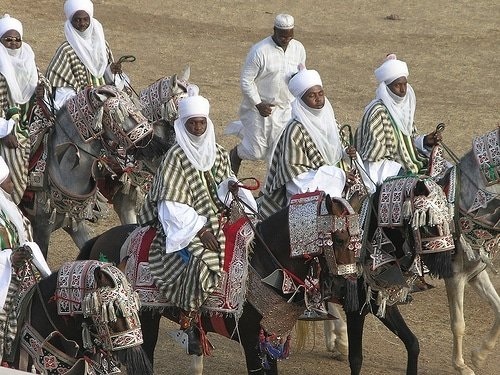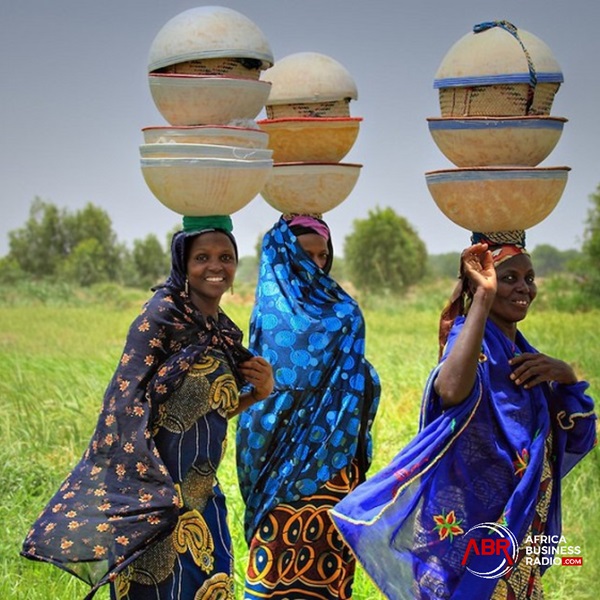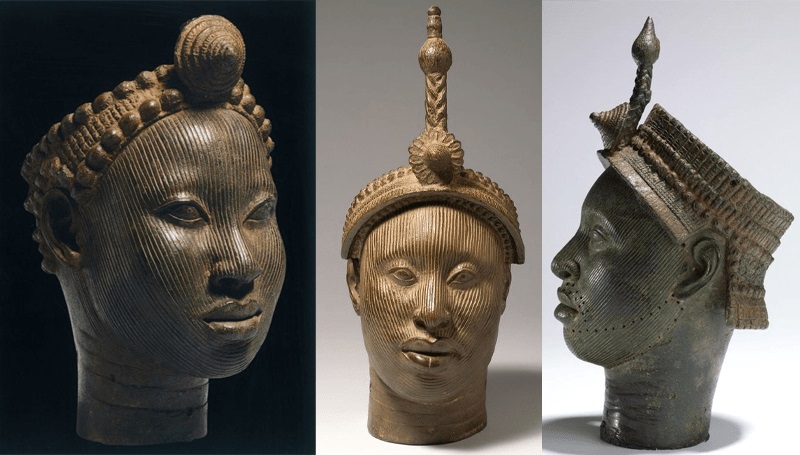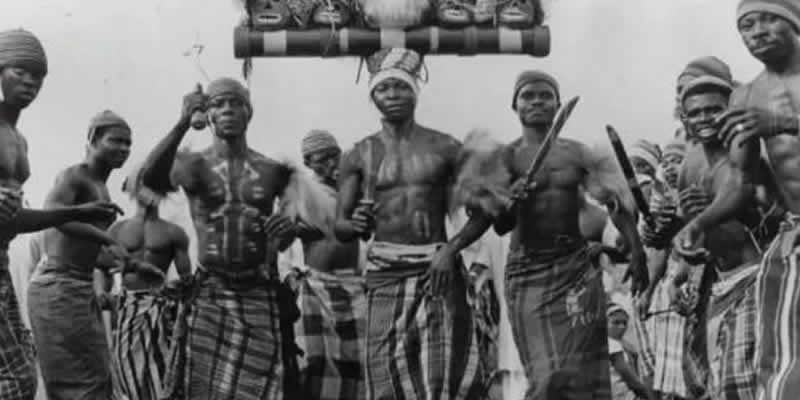The history of Nigeria’s major tribes—Hausa-Fulani, Yoruba, and Igbo—spans centuries, characterized by rich cultures, traditions, and influences that have shaped the nation’s identity.
Hausa-Fulani:
- Origin and Early History: The Hausa people trace their roots to the Hausa Bakwai (Seven True Hausa States) founded around 1000 AD. Over time, these city-states expanded and formed the Hausa Kingdoms. The Fulani, a nomadic pastoralist group, arrived in the Hausa lands around the 14th century, and through peaceful and military means, they gained influence and leadership positions. This fusion of Hausa and Fulani cultures gave rise to the Hausa-Fulani ethnic group.
The Hausa-Fulani ethnic group is a result of a historical merging of two distinct ethnic entities: the Hausa and the Fulani.
Hausa

- Origin and Early Settlement: The Hausa people are believed to have settled in the northern regions of present-day Nigeria around 1000 AD. They established city-states collectively known as the Hausa Bakwai (Seven True Hausa States), which included Daura, Kano, Katsina, Zazzau (Zaria), Gobir, Rano, and Biram.
- Cultural and Socioeconomic Development: The Hausa city-states developed a rich culture and a system of governance. Each city had its ruler and administration. They engaged in trade, agriculture, and craftsmanship, contributing to the prosperity and cultural advancement of the region.
Fulani

- Origins and Migration: The Fulani, a nomadic and pastoralist group, originated from the Futa Toro region (modern-day Senegal) in West Africa. Around the 14th century, led by their religious leader Usman dan Fodio and his family, the Fulani began migrating eastward, seeking pastures for their cattle and spreading Islam.
- Integration with Hausa States: The Fulani encountered the Hausa city-states and gradually integrated into the existing social and political structures. They established relationships through intermarriage, alliances, and sometimes conflict, leading to a fusion of Hausa and Fulani cultures.
Formation of the Hausa-Fulani:
- Cultural Synthesis: Over time, the interaction between the Hausa and Fulani resulted in a synthesis of cultures and traditions. The Fulani adopted some aspects of Hausa culture, including language and administration, while also imparting their pastoralist lifestyle and Islamic influence to the Hausa societies.
- Sokoto Caliphate: One of the pivotal moments in the history of the Hausa-Fulani was the establishment of the Sokoto Caliphate by Usman dan Fodio in the early 19th century. This Islamic empire unified many Hausa city-states and surrounding territories under the banner of Islam, creating a centralized administration and spreading Islamic education and governance.
The Hausa-Fulani identity evolved from this historical intermingling of Hausa and Fulani cultures, combining elements of language, governance, religion (primarily Islam), and societal structures. The Sokoto Caliphate, with its Islamic influence and administrative reforms, significantly shaped the Hausa-Fulani identity and left a lasting impact on the northern regions of Nigeria.
Cultural Influence
The Hausa-Fulani people are known for their rich cultural heritage, including language, art, music, and the prominence of traditional Muslim values and institutions. The Sokoto Caliphate, established by the Fulani leader Usman dan Fodio in the early 19th century, had a significant impact on the region, spreading Islam and establishing a centralized administration.
The Hausa-Fulani cultural influence in Nigeria is deep-rooted and encompasses various aspects that have contributed significantly to the nation’s identity:
Language and Communication:
- Hausa Language: The Hausa language, widely spoken across West Africa, serves as a unifying factor among diverse ethnic groups. It’s a prominent language in commerce, administration, and everyday communication in Nigeria’s northern regions.
- Arabic Influence: Due to historical interactions with Arab traders and scholars, Arabic script is used for writing Hausa, and Islamic education often involves learning Arabic.
Religion and Traditions:
- Islam: The Hausa-Fulani have a strong Islamic heritage, and Islam permeates various aspects of their lives, including governance, education, and social structure. Mosques are central to communities, and Islamic teachings influence customs, laws, and societal norms.
- Traditional Beliefs: Despite Islamic influence, some pre-Islamic beliefs and cultural practices still exist within Hausa-Fulani culture, blending with Islamic traditions.
Art, Crafts, and Dress:
- Textiles and Weaving: The region is known for vibrant and intricately designed textiles like the famous ‘Hausa/Fulani’ embroidery and weaving, with distinct patterns and techniques.
- Music and Dance: Hausa-Fulani music, with instruments like the talking drum (kalangu), tend to reflect cultural themes and celebrations. Traditional dances and festivals are occasions to showcase cultural richness.
Social Structure and Values:
- Family and Community: Hausa-Fulani society emphasizes strong family ties and communal living. Extended families play a crucial role in social support, and communal solidarity is highly valued.
- Hierarchical Structure: The social structure often follows a hierarchical order, with traditional leaders (emirs) holding significant influence, guiding communities in matters of governance, justice, and cultural practices.
Cuisine and Hospitality:
- Fulani Cuisine: The Fulani, known for their pastoral lifestyle, have culinary traditions centered around dairy products like fresh milk, cheese, and yogurt.
- Hausa Cuisine: Hausa culinary traditions include dishes like tuwo shinkafa (rice pudding), miyan kuka (baobab leaf soup), and a variety of spiced meats.
Education and Literature:
- Islamic Education: Quranic schools (madrassas) are prevalent, teaching Arabic and Islamic studies, contributing to the preservation of language and religious knowledge.
- Literary Heritage: Hausa literature, both oral and written, includes poetry, folklore, and proverbs that pass down cultural values, history, and wisdom.
The Hausa-Fulani cultural influence remains a cornerstone in Nigeria’s cultural mosaic, shaping the country’s heritage, traditions, and societal norms.
Political Influence:
The Hausa-Fulani played a crucial role in pre-colonial and post-independence Nigerian politics. They were integral to the formation of the Northern People’s Congress (NPC), a dominant political party in the north during Nigeria’s early years as an independent nation.
The political influence of the Hausa-Fulani ethnic group in Nigeria has been profound, spanning pre-colonial, colonial, and post-independence eras. Here’s an overview:
Pre-Colonial Era:
- Hausa Kingdoms: The Hausa people established a network of city-states known as the Hausa Bakwai. These states, including Kano, Katsina, Zaria, and others, were influential centers of trade, administration, and culture in West Africa. They had organized systems of governance and trade relationships that extended beyond their borders.
- Fulani Influence: In the 19th century, the Fulani, under the leadership of Usman dan Fodio, initiated the Sokoto Caliphate. This theocratic empire brought together various Hausa city-states under a centralized Islamic administration. It wielded significant political and religious power across the region.
Colonial Era:
- British Rule and Indirect Rule: With the arrival of the British in the late 19th century, Nigeria was colonized. The British adopted the policy of “Indirect Rule,” leveraging existing traditional structures for governance. The Hausa-Fulani elite were integrated into the colonial administration due to their established systems of governance, aiding the British in their rule.
- Northern Protectorate: The British divided Nigeria into regions, and the Northern Region encompassed predominantly Hausa-Fulani territories. The Emirs and traditional rulers maintained considerable influence and administrative roles under colonial rule, preserving aspects of their authority.
Post-Independence:
- Political Dominance: After gaining independence in 1960, Nigeria experienced political struggles among its various ethnic groups. The Northern People’s Congress (NPC), predominantly supported by the Hausa-Fulani population, was a dominant political force in the Northern Region. This gave the Hausa-Fulani considerable influence at the federal level.
- Military Coups and Governance: Nigeria faced several military coups, and the military assumed power intermittently. The Hausa-Fulani elite, including military figures like General Yakubu Gowon and later General Muhammadu Buhari, held significant positions of power, contributing to the region’s continued political influence.
- Civilian Rule and Political Parties: The return to civilian rule saw the prominence of parties like the National Party of Nigeria (NPN), which had support primarily from the North, consolidating the Hausa-Fulani political hold.
- Current Political Landscape: The Hausa-Fulani political influence persists in contemporary Nigeria. Their demographic size, historical dominance, and continued political participation ensure their presence in national politics, though power dynamics have shifted over time with the emergence of new political forces and regions demanding greater representation.
The Hausa-Fulani’s historical legacy, coupled with their demographic strength and political organization, has cemented their enduring influence on Nigerian politics.
Yoruba

Origin and Early Civilization: The Yoruba civilization dates back to around 500 BC and was centered in the region that is now southwestern Nigeria and parts of Benin and Togo. The Yoruba people developed city-states, notably Ife and Oyo, known for their artistic achievements, such as the renowned Ife bronze and terracotta sculptures.
The origin and early civilization of the Yoruba people trace back to antiquity, creating one of Africa’s most prominent and sophisticated cultures.
Ancient Origins:
- Timeline: The Yoruba civilization is believed to have emerged around 500 BC in the region that encompasses present-day southwestern Nigeria, parts of Benin, and Togo.
- City-States and Kingdoms: The Yoruba established several city-states, among which Ife and Oyo became particularly prominent. Ife, regarded as the cradle of Yoruba civilization, was known for its artistic achievements and spiritual significance. Oyo, on the other hand, evolved into a powerful kingdom and empire.
Ife Civilization:
- Cultural Significance: Ife was renowned for its exquisite artistry, notably the creation of the famous Ife bronze and terracotta sculptures. These sculptures depicted the sophistication and high level of skill in the artistry of the Yoruba people.
- Spiritual Beliefs: Ife was the center of spiritual and religious practices for the Yoruba. It was believed to be the place where humanity began according to Yoruba mythology. The city was associated with important deities and spiritual figures in Yoruba cosmology.
Oyo Empire:
- Rise of Oyo: The Oyo Empire emerged around the 14th century, expanding from a small kingdom to a powerful empire. Oyo gained strength through military prowess, diplomacy, and a well-organized political system.
- Political Structure: The Oyo Empire had a centralized political structure with a hierarchical system of governance led by the Alaafin (the Oba of Oyo) and a council of chiefs. It exerted control over a vast territory through a system of provincial governors.
Socioeconomic Influence:
- Trade and Commerce: The Yoruba people were active traders who engaged in extensive commercial activities, including long-distance trade with other African regions. This commerce helped them accumulate wealth and establish economic prosperity.
- Social Organization: Yoruba society was structured into various social classes, with artisans, farmers, warriors, and rulers holding distinct roles. Lineage and family connections played a crucial role in social organization.
Legacy:
The Yoruba civilization’s legacy endures in Nigeria and beyond. Its artistic achievements, religious and spiritual beliefs, political structures, and rich cultural heritage have left an indelible mark on African history. The Yoruba language, traditions, and cultural practices continue to be celebrated and preserved, contributing to Nigeria’s diverse cultural tapestry.
Cultural and Religious Significance:
Yoruba culture is rich in art, religion (with deities like Ogun, Sango, and Yemoja), and a complex system of governance. The Oyo Empire was a powerful Yoruba state that controlled a vast area through a well-organized political structure.
The Yoruba people of southwestern Nigeria have a rich cultural and religious heritage that has evolved over centuries, marked by vibrant traditions and spiritual beliefs.
Origin and Cultural Development:
- Early Civilization: Yoruba history traces back to around 500 BC with the emergence of distinct settlements, notably Ife and Oyo. Ife is considered the spiritual center of the Yoruba people, known for its artistic achievements, particularly the exquisite terracotta and bronze sculptures.
- Artistic and Architectural Prowess: Ife’s artistry produced iconic sculptures that depicted the human form in great detail and elegance. These artworks conveyed the Yoruba’s reverence for their deities and royalty. The Yoruba also built impressive architectural structures, reflecting their advanced societal organization and craftsmanship.
Religious Beliefs and Practices:
- Yoruba Pantheon: The Yoruba have a complex religious system with a pantheon of deities known as the Orishas. Each Orisha represents different aspects of life, nature, and human endeavors. For instance, Ogun symbolizes iron and war, while Sango represents thunder and lightning.
- Orisha Worship: Yoruba religion involves the veneration of these Orishas through rituals, ceremonies, and festivals. Worshipers perform rites to honor and seek blessings from these deities, often involving music, dance, prayers, and offerings.
- Influence on the Diaspora: Yoruba religious beliefs, including the worship of Orishas, have transcended Nigeria’s borders. Due to the transatlantic slave trade, Yoruba traditions have influenced various Afro-Caribbean and Latin American religions, such as Santeria in Cuba, Candomblé in Brazil, and Vodou in Haiti.
Socio-Political Structure:
- Oyo Empire: The Yoruba society was organized into city-states, with the Oyo Empire being the most prominent. The Oyo Empire had a highly structured political system with a centralized monarchy headed by the Alaafin of Oyo. This empire controlled vast territories and was a dominant force in the region.
- Council of Elders: Yoruba governance included a council of elders called the Ogboni, who played significant roles in decision-making, conflict resolution, and the maintenance of societal order.
Modern Cultural Impact:
- Art, Literature, and Music: Yoruba cultural expressions continue to thrive in modern Nigeria. Yoruba art, literature, music, and folklore remain influential, reflecting both traditional and contemporary themes.
- Political Influence: The Yoruba have played influential roles in Nigerian politics, contributing to the nation’s political landscape through various movements, parties, and leaders like Obafemi Awolowo and others who championed the region’s interests.
The cultural and religious significance of the Yoruba people remains deeply ingrained in Nigeria’s identity, shaping not only the southwestern region but also influencing global artistic, religious, and cultural landscapes.
Top of Form
Modern Influence:
The Yoruba people have had a significant impact on Nigeria’s cultural, political, and artistic landscape. They were instrumental in the formation of the Action Group, a prominent political party in the pre-independence and early post-independence era.
The modern influence of the Yoruba tribe in Nigeria has been multifaceted, extending across various aspects of the country’s socio-political, cultural, and economic realms.
Political Influence:
- Pre-Independence Era: The Yoruba played a significant role in Nigeria’s political landscape prior to independence. Leaders such as Chief Obafemi Awolowo were instrumental in the formation of the Action Group (AG), a political party advocating for Yoruba interests. Awolowo’s ideologies focused on social welfare, free education, and regional development.
- Post-Independence: After Nigeria gained independence in 1960, Yoruba politicians continued to be prominent figures in the country’s governance. The Western Region, predominantly Yoruba, saw Awolowo as its leader. However, political tensions and power struggles at the federal level affected the influence of the Yoruba in national politics.
Cultural Contributions:
- Arts and Literature: The Yoruba have contributed significantly to Nigeria’s vibrant artistic and literary scene. Renowned writers like Wole Soyinka, Africa’s first Nobel laureate in Literature, and Chinua Achebe drew inspiration from Yoruba culture, infusing their works with Yoruba folklore and societal elements.
- Religious Practices and Festivals: Yoruba religious practices, including the worship of traditional deities (Orishas) and the elaborate festivals associated with these beliefs, have had a lasting impact on Nigerian cultural identity. Festivals like the Osun Osogbo festival attract both local and international attention, celebrating Yoruba spirituality and heritage.
Educational Development:
- Advocacy for Education: One of the hallmarks of Yoruba influence has been the strong advocacy for education. Leaders like Awolowo emphasized the importance of education for societal progress. This led to the establishment of free primary education in the Western Region during his tenure.
Economic Contributions:
- Commerce and Trade: Historically, the Yoruba have been known for their enterprising spirit and involvement in commerce. Cities like Lagos, a predominantly Yoruba region, have served as major economic hubs in Nigeria, contributing significantly to the country’s trade and economic development.
Contemporary Influence:
- Political Representation: Yoruba politicians and leaders continue to be active participants in Nigerian politics. The Yoruba have contributed to the formation of political alliances and parties, advocating for regional interests and national development.
- Cultural Preservation: Efforts to preserve and promote Yoruba culture persist, with initiatives to sustain traditional practices, language, arts, and heritage.
The Yoruba’s influence in Nigeria remains substantial, reflecting a blend of historical legacies, cultural prominence, and ongoing contributions to the nation’s development.
Top of Form
Igbo

Early Settlements:
The Igbo people are believed to have settled in their current homeland in southeastern Nigeria around the 9th century AD. They developed a decentralized society comprising various autonomous communities, each with its own governance system.
The history of the early settlements of the Igbo people is fascinating, marked by their migration, establishment of communities, and the evolution of a unique social structure.
Migration and Settlement:
- Origins: The origins of the Igbo people are believed to trace back to the Niger area around 9th century AD. They are considered to be a part of the larger group of Bantu-speaking people who migrated eastward and settled in the forested region of southeastern Nigeria.
- Settlement Patterns: Igbo settlements were primarily decentralized and comprised various autonomous communities known as villages or towns. These settlements were scattered across the region, each with its own leadership structure and governance system.
Social Structure and Governance:
- Clan-Based Society: Igbo society was organized around clans, with each clan having its own lineage, customs, and leadership. The villages were often formed by clusters of related families or lineages within a clan.
- Democratic Governance: Decision-making was largely decentralized and democratic, involving councils of elders and heads of lineages who deliberated on communal matters. Each village had its own assembly where decisions affecting the community were made.
Economy and Trade:
- Agriculture: The Igbo were primarily agricultural, cultivating crops such as yams, cassava, and other staples. Their agricultural prowess contributed to their self-sufficiency and economic stability.
- Trade Networks: Igbo communities engaged in vibrant trade networks within and beyond their region. They exchanged goods and services, including locally produced items like pottery, textiles, and metalwork, with neighboring societies.
Religion and Culture:
- Religious Beliefs: Igbo spirituality was characterized by a belief in various deities, spirits, and ancestral worship. They had a diverse spiritual pantheon and rituals that were integral to their cultural practices.
- Art and Creativity: Igbo artistic expressions were vibrant, seen in their pottery, sculpture, masks, and other forms of art that often held deep spiritual or symbolic significance.
Impact of Colonialism:
- British Influence: With the arrival of British colonial forces in the late 19th century, the Igbo region came under British rule as part of the Southern Protectorate. This colonial period significantly impacted Igbo society, introducing changes in governance, economy, and education.
- Colonial Legacy: The British colonial administration imposed indirect rule, which involved utilizing traditional leaders in their governance structure. This period also witnessed the spread of Western education and Christianity, which gradually influenced Igbo culture and societal structures.
The early settlements of the Igbo people were characterized by a rich cultural heritage, decentralized governance, and a resilient socioeconomic system that shaped their identity and continues to influence Igbo society today.
Cultural and Socioeconomic Structure:
Igbo society was characterized by a republican system, where decisions were made by a council of elders. They were known for their vibrant trade networks and entrepreneurial spirit, contributing significantly to regional commerce.
The Igbo people of southeastern Nigeria have a vibrant history that includes their unique cultural and socioeconomic structures.
Cultural Structure:
- Decentralized Society: Igbo society was traditionally organized into autonomous communities called villages or clans, each with its own leadership structure. Decision-making was communal, involving councils of elders and titled individuals.
- Religious Beliefs and Practices: The Igbo practiced a diverse array of religious beliefs centered on deities and spirits. They revered a pantheon of gods and goddesses, with Ala, the earth goddess, holding significant importance. Ancestor veneration was also prevalent.
- Art, Music, and Oral Traditions: Igbo culture is rich in artistic expression. Intricate wood carvings, masks, pottery, and colorful masquerades are integral parts of Igbo art. Music, dance, and storytelling played essential roles in passing down history, traditions, and values through generations.
- Social Organization: Igbo society had a system of social classes, including titled individuals recognized for their achievements, wealth, or lineage. The titleholders had specific responsibilities and were influential in decision-making processes.
Socioeconomic Structure:
- Trade and Commerce: The Igbo were known for their thriving trade networks both within their communities and beyond. Markets were essential hubs for economic activities, where goods and services were exchanged. The region was recognized for its enterprising spirit and individual commercial endeavors.
- Agriculture: Agriculture formed a cornerstone of Igbo livelihoods. They cultivated various crops such as yams, cassava, maize, and palm produce. The importance of yam farming extended into cultural practices, as yam festivals were celebrated to honor the significance of this crop.
- Family and Kinship: Igbo society was matrilineal, tracing descent through the mother’s lineage. Families were fundamental units and played significant roles in social, economic, and political activities. Extended families lived together, contributing to communal living and shared responsibilities.
- Legal and Governance Systems: The Igbo had intricate systems of justice and conflict resolution. Disputes were settled through community gatherings, where consensus and mediation were prioritized. Elders and titled individuals often served as arbiters.
The impact of colonialism and subsequent modernization has brought changes to Igbo society, yet many of these cultural and socioeconomic structures persist, influencing the region’s dynamics and contributing to the diverse tapestry of Nigerian culture.
Colonial Era and Independence:
The Igbo were affected by British colonization, and the region was part of the Southern Protectorate. Post-independence, they played a vital role in Nigerian politics, notably through the Eastern Region, with leaders like Nnamdi Azikiwe and later Chukwuemeka Odumegwu Ojukwu during the Biafran War, which sought to establish an independent Igbo state.
The history of the Igbo people during the Colonial Era and Independence in Nigeria is marked by significant socio-political shifts, struggles for autonomy, and ultimately, the quest for self-determination.
Colonial Era:
- British Contact: The Igbo region, part of the Southern Protectorate of Nigeria, came under British colonial rule in the late 19th and early 20th centuries. The British established control through treaties, often exploiting existing tensions between different ethnic groups.
- Impact on Society: British colonialism introduced new administrative structures, education systems, and economic changes that significantly affected Igbo society. Missionary activities also influenced the spread of Christianity in the region, alongside existing indigenous beliefs.
- Economic Shifts: The Igbo, known for their trading acumen, adapted to the changing economic landscape. They engaged actively in trade, commerce, and entrepreneurial activities, both locally and across Nigeria, making them a prominent force in the country’s economy.
Path to Independence:
- Political Awakening: The Igbo played a crucial role in Nigeria’s struggle for independence. Notable figures like Nnamdi Azikiwe emerged as prominent leaders advocating for self-rule. Azikiwe, an Igbo nationalist, founded the National Council of Nigeria and the Cameroons (NCNC) party, which sought independence and unity among Nigeria’s diverse ethnic groups.
- Pre-Independence Politics: Igbo leaders participated actively in negotiations for Nigeria’s independence. They were influential in shaping the political landscape, contributing to the formation of alliances and political movements.
Post-Independence Challenges:
- Ethnic Tensions: Nigeria gained independence from British rule in 1960, but ethnic and regional tensions surfaced immediately. The struggle for power among various ethnic groups intensified, leading to political instability.
- Biafran Secession: In 1967, the Igbo-dominated Eastern Region declared independence as the Republic of Biafra, led by Chukwuemeka Odumegwu Ojukwu. This declaration sparked the Nigerian Civil War (1967-1970), also known as the Biafran War, as the Nigerian government aimed to prevent the secession. The war resulted in significant loss of life and hardship, especially in the Igbo heartland.
- Post-War Reintegration: After the war, efforts were made to reintegrate the Igbo back into the Nigerian state. Reconstruction and reconciliation processes sought to heal wounds and foster unity among Nigeria’s diverse ethnic groups.
The Colonial Era and quest for Independence profoundly shaped the Igbo people’s collective identity, their struggle for self-determination, and their subsequent integration into the larger Nigerian nation.
